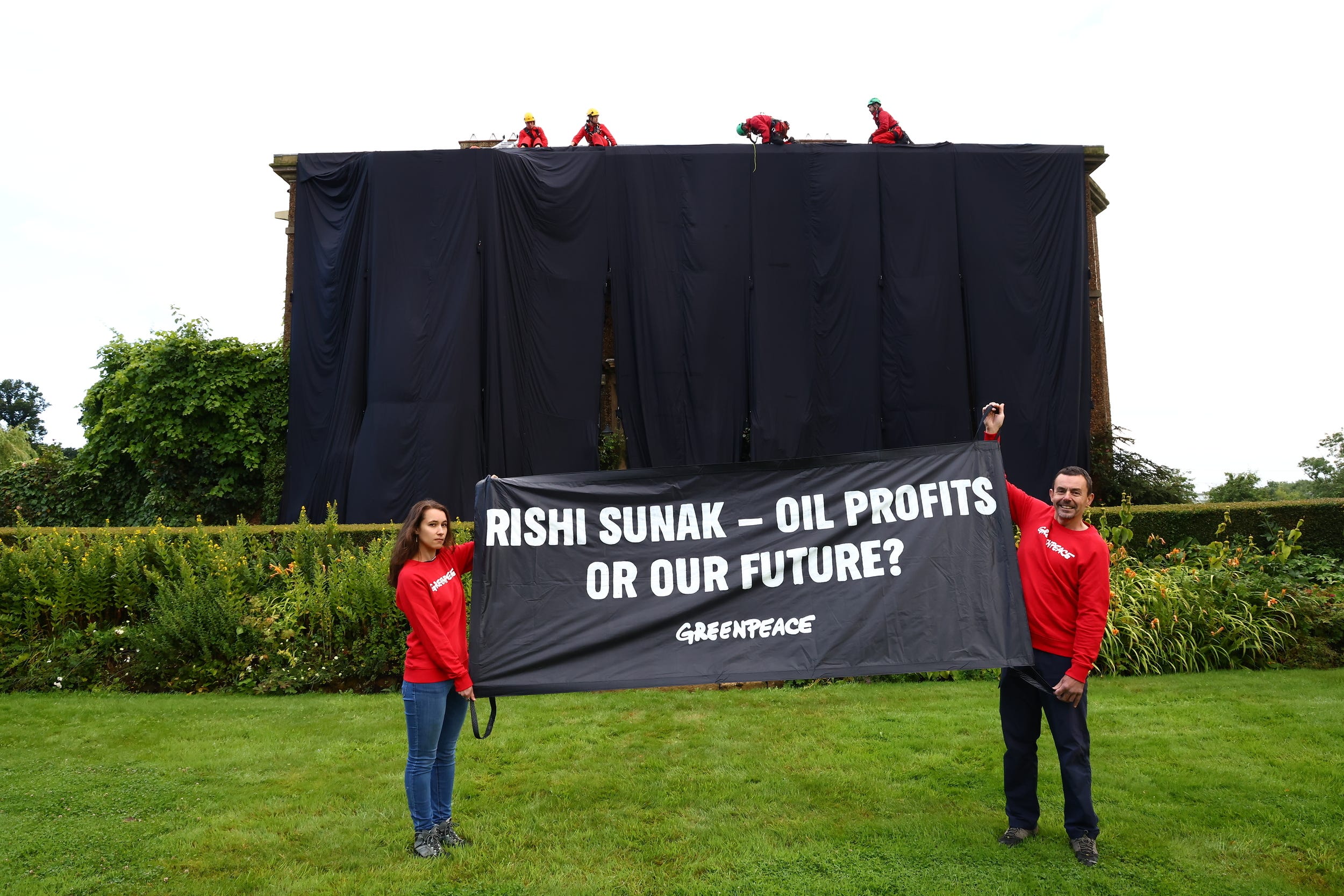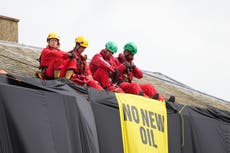Greenpeace’s attack on Rishi Sunak’s home is a violation that only trashes their brand
The stunt by five Greenpeace activists who climbed on to the roof of Rishi Sunak’s home and draped it in black cloth was no silly student caper, it was harassment, writes John Rentoul. It could hardly have been better designed to undermine public support for its cause


Rishi Sunak has been accused of “trashing his brand”. Some people who thought he was the second coming of Blairite reasonableness have been disappointed by his enthusiasm for new drilling for North Sea oil and gas.
And yet, not to be outdone, Greenpeace has decided that its response to this chance to press its arguments should be to trash its own brand. The stunt by five Greenpeace activists, who climbed on to the roof of the prime minister’s North Yorkshire home and draped it in black cloth, could hardly have been better designed to undermine public support for its cause.
What ought to be doubly frustrating for Greenpeace supporters is that Greenpeace has a successful brand to trash. In contrast to Just Stop Oil and Extinction Rebellion, Greenpeace is well regarded by the British public. Before it invaded the Sunaks’ privacy, it was liked by 49 per cent and disliked by 19 per cent, according to YouGov. For Extinction Rebellion, those numbers are more or less the other way round (17 and 46 per cent), whereas Just Stop Oil records an unfavourability rating of 64 per cent.
Most people will not react to Greenpeace’s stunt by saying, “They are right, you know, the experts are clear that we cannot afford any new oil and gas.” A small minority might think that, but only because that is what they feel strongly already. Most people will think: I don’t care how strongly you feel about something, it is outrageous to invade someone’s house even if you know they aren’t there, and what on earth were the police doing?
Most people feel that politicians’ homes and families are out of bounds, and they are not confused, as Greenpeace seems to be, by the Sunaks’ personal wealth. Greenpeace put out a statement saying its activists had spent five hours on top of “Rishi Sunak’s luxury mansion”, but the luxuriousness of an MP’s constituency home is irrelevant to the question of the right policy on the climate emergency. Nor is it any use Greenpeace claiming that its activists had made sure that “no damage was caused” – that does not wipe out the sense of violation and intimidation with which most people would identify.
Nor is this the first time Greenpeace has crossed the line. In November it projected a video about the cost of living on the side of the prime minister’s house. This is a campaign of harassment.
Put these silly student dares down as a blunder by the wider green movement. Attitudes towards net zero are polarising, as is inevitable as the short-term costs start to become more apparent, and as an election looms. This latest stunt has ensured that people divide more against net zero than for it.
What else can we do, ask well-meaning activists who feel passionately that the prime minister is a “climate arsonist” who is destroying humanity’s future. Direct action feels as if it is the only way to gain people’s attention, and the more transgressive it is, the more attention it attracts.
Extinction Rebellion (XR) struggled with the same problem, from a less advantageous starting point. In January this year, it abandoned direct action, recognising that stopping people from getting to work was the wrong way to build mass support for radical climate action.
Yet its attempt to put pressure on parliament by staging daily demonstrations outside fizzled out when embarrassingly few people turned up on a day that the House of Commons was not sitting.
All the same, the democratic instinct is right. There are no shortcuts to effective action to slow down climate change. It can be done only if it is supported by the people –and not just the people of this country but of the world. That means, as Tony Blair, the original reasonable Blairite, pointed out last month, that Britain is more important for leading and persuading world opinion than for actually cutting its own emissions, valuable though that may be.
Net zero is not comparable to the campaign for women’s votes or the struggle against apartheid, where a majority supported a cause that was obstructed by an undemocratic minority. Greenpeace’s attempt to portray Sunak as the puppet of the oil companies is not just woefully simplistic but plain wrong. He needs the votes of the people in a democracy, and the most votes are currently available to politicians who take a “proportionate and pragmatic” approach to net zero.
Until Greenpeace can find a way of leveraging its favourable public image into winning that argument, it is condemned to doing Sunak’s work for him in driving people away from the more radical options in dealing with the climate emergency.




Join our commenting forum
Join thought-provoking conversations, follow other Independent readers and see their replies
Comments